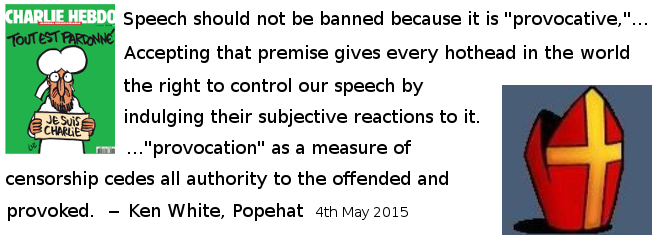There are two problems at issue here:
- the perception of copyright as property; it's not, it's a monopoly
- the desire to control the PERCEPTION of a person's image and reputation
That the author has been caught up in the copyright maximalists' web of deceit despite her legal background is sad enough, but that she uses their techniques to trap herself in an endless game of whack-a-mole censorship is downright annoying. That is not what copyright is ostensibly for. At no point will the most rabid copyright fanboi* stroll up to you and declare: "Copyright is an awesome censorship tool. You can totally shut down unwanted speech by using DMCA as and when required." Copyright is apparently** for the purpose of compensating authors and artists for their work and ensuring that they can make a living while providing us with cultural works. So... why is this woman using DMCA and censorship to deal with an online mockery problem?
This is ostensibly about empowerment
Look, people, I'm a fat girl too. Here I am in all my glory. It's not a terribly flattering picture of me, is it? It's not a big leap to imagine this picture going viral while total strangers take the ever-loving mickey out of me. However, the last thing I'd ever do is go charging after every grubby purveyor of "lulz" in existence demanding that they take the picture down right this minute if they're not saying kind, supportive things about me. That would simply get me into a never-ending game of whack-a-mole I'd have no chance of winning.
Next, I began the monumental task of sending out copyright violation notices to the websites hosting the image — I would have to issue hundreds of them... I still go through the less tasteful side of the Internet monthly and issue take-down notices for new instances, but it’ll never be completely gone... - My embarrassing picture went viral - Caitlin Seida in Salon
It's no fun living life on the back foot, but she's committed to it because she wants
Just to be seen a little bit more as I want[ed] to be.
There's the problem. If you read the article again you find that she's been made to feel ashamed of being fat. It's pretty much embedded in our psyche from an early age; if you're not do-able, you're no good. That Caitlin needs to be made up to look pretty so she can feel good about herself is the problem. Yes, people were being mean about her, but she doesn't seem to understand that they make themselves look ten times worse than the people they mock. Would you go out for a drink with a person who thought it was funny to pillory people online? I wouldn't. The mockery got to Caitlin and she's been confronting the commenters, calling them out for their appalling behaviour. That it seems to have worked for her is great but I'm uncomfortable with her use of DMCA to get the pictures taken down.
This is actually about control
I've pointed out before that copyright is increasingly being used to control content distribution and to enable authors and publishers, etc., to pretend they can control the perception of their products even though this is actually impossible in practice. However, it's not just about content creators. Techdirt has posted many articles about copyright takedown notices (DMCA) being used to remove undesirable comments, and like it or not, this is the same kind of censorship. There is no other word for it.
Authoritarian mission creep is creepy
In every conversation I've ever had with the pro-copyright crowd, they deploy emotional arguments to bolster their claims that all who oppose them are Big Meanies who don't care about their problems. Caitlin does the same thing here in the guise of empowerment. She sees herself as a social justice warrior kicking ass and taking names when what she's really doing is giving the copyright lobby yet another excuse to expand its scope for censoring free speech because some speech genuinely hurts people's feelings.
None of this means I condone the horrible treatment she suffered. Heck, I've been on the end of it myself and it's not fun at all. However, if you go after people with a view to controlling their speech because it's offensive to you as a fat girl, how can you then defend Charlie Hebdo, which makes cruel, hateful remarks about religion and religious people? I'm not sure if she ever did or not, it's a rhetorical question. The point is, it's all well and good to ask random strangers if they feel good about the allegedly funny comment they left on a mockery website, that's counter-speech. It's another thing altogether to bring down the full weight of the law onto people for reposting a picture you made public but not for the purpose of earning money.
Again, the object of her DMCA takedowns is control of the public perception of her image. If I reposted it here and said, "She looks better in shorts and glasses than I do," Caitlin would have no problem with that, I'm sure. However, if I joined the ranks of haters who make fun of her, she'd be after me in a flash. Now imagine it's not a chubby woman, but a religious figure, and adherents of the religion in question went after websites where horrible comments were being made about him (or her) and demanded the removal of the image where the figure was portrayed in an unflattering light. First Amendment howlings in 3...2...1...
NOW can you see what the problem is? I'll leave it to Ken "Popehat" White to have the last word:
*There are several contenders for the job. Don't get me started.
**The proponents cross their hearts and hope to die.
**The proponents cross their hearts and hope to die.




No comments:
Post a Comment